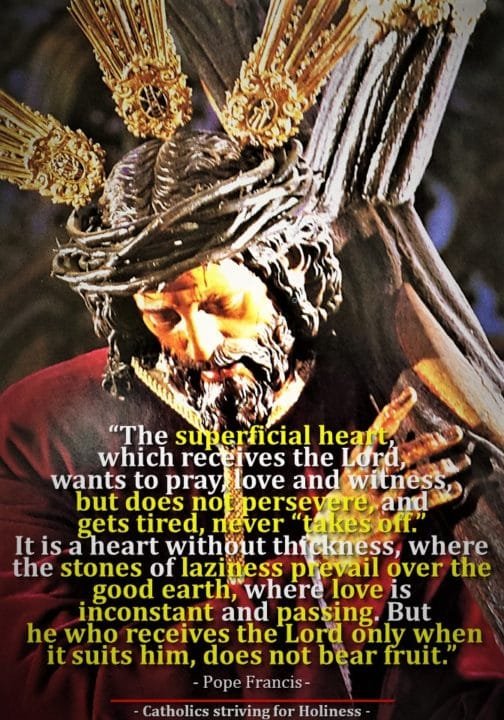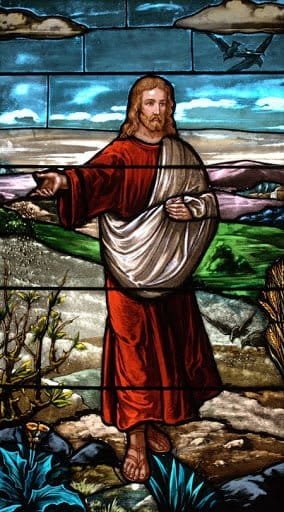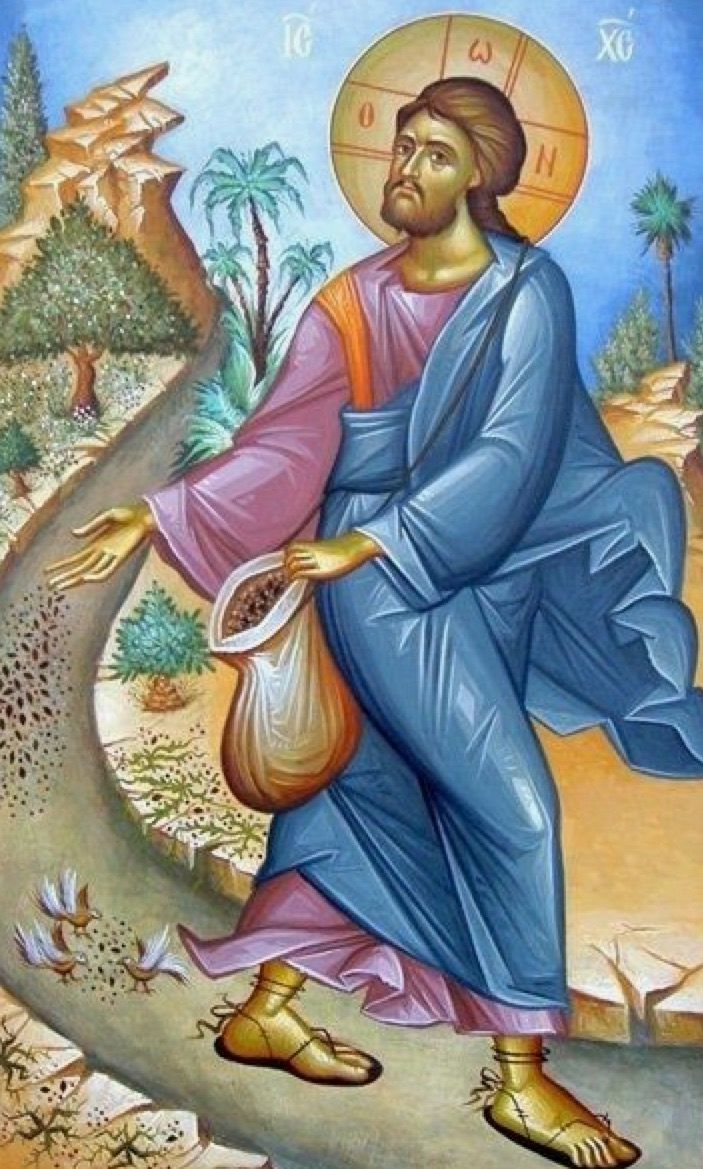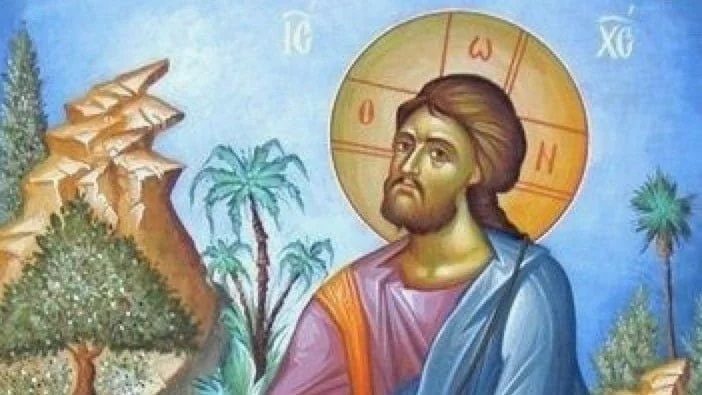THE PARABLE OF THE SOWER
POPE FRANCIS ON THE 15th SUNDAY IN ORDINARY TIME YEAR A
THE PARABLE OF THE SOWER

ANGELUS
Saint Peter’s Square
15th Sunday in Ordinary Time year A, 16 July 2023
______________________________________
Dear brothers and sisters, buongiorno!
Today the Gospel presents us the parable of the sower (cf. Mt 13:1-23). “Sowing” is a very beautiful image, and Jesus uses it to describe the gift of his Word. Let us imagine a seed: it is tiny, barely visible, but it makes plants grow that bear fruit. The Word of God is thus: think of the Gospel, a small book, simple and within reach of all, that produces new life in those who receive it. So, if the Word is the seed, we are the soil: we can receive it or not. But Jesus, the “good sower”, does not tire of sowing it generously. He knows our terrain, he knows that the stones of our inconstancy and the thorns of our vices (cf. vv. 21-22) can suffocate the Word, yet he hopes, he always hopes that we can bear abundant fruit (cf. v. 8).
This is what the Lord does, and this is what we too are required to do: to sow tirelessly. But how can one do this, sow continually without tiring? Let us take a few examples.
Firstly parents, firstly parents: they sow goodness and faith in their children, and they are called to do so without being discouraged even if at times they seem not to understand or to appreciate their teachings, or if the mentality of the world is against them. The good seed remains, this is what counts, and it will take root in due time. But if, giving in to mistrust, they give up sowing and leave their children at the mercy of fashions and mobile phones, without dedicating time to them, without educating them, then the fertile soil will be filled with weeds. Parents, never tire to sow in your children!
Let us look, then, at the young: they too can sow the Gospel in the furrows of everyday life. For example, with prayer: it is a small seed that you cannot see, but with which you entrust everything you live to Jesus, and so he can make it ripen. But I am also thinking of the time to dedicate to others, to those most in need: it may seem wasted; instead, it is holy time, while the apparent satisfactions of consumerism and hedonism leave one empty-handed. And I think of study: it is true, it is tiring and not immediately satisfying, like sowing, but is essential to build a better future for all.
We have seen parents, we have seen the young; now let us look at the sowers of the Gospel, many good priests, religious and laypeople engaged in proclamation, who live and preach the Word of God often without immediate success. Let us never forget, when we proclaim the Word, that even where it seems that nothing is happening, in reality the Holy Spirit is at work, and the kingdom of God is already growing, through and beyond our efforts. Therefore, go ahead joyfully, dear brothers and sisters! Let us remember the people who placed the seed of the Word of God in our life: each one of us, think of “how my faith began”. Perhaps it germinated years after we encountered their examples, but it happened thanks to them!
In the light of all this, we can ask ourselves: do I sow goodness? Do I only care about reaping for myself, or do I also sow for others? Do I sow some seeds of the Gospel in everyday life: study, work, free time? Do I get discouraged or, like Jesus, do I continue to sow, even if I do not see immediate results? May Mary, whom we venerate today as the Blessed Virgin of Mount Carmel, help us to be generous and joyful sowers of the Good News.
Source: https://www.vatican.va/content/francesco/en/angelus/2023/documents/20230716-angelus.html
ANGELUS
Saint Peter’s Square
Sunday, 12 July 2020
Dear Brothers and Sisters, Good morning!
In this Sunday’s Gospel passage (cf. Mt 13:1-23), Jesus tells a great crowd the Parable — that we all know well — of the Sower, who casts seeds over four different types of terrain. The Word of God, symbolized by the seeds, is not an abstract Word, but rather Christ himself, the Word of the Father who became flesh in Mary’s womb. Embracing the Word of God therefore, means embracing the personage of Christ; of Christ himself.
There are several different ways to receive the Word of God. We may do so like a path, where birds immediately come and eat the seeds. This would be distraction, a great danger of our time. Beset by lots of small talk, by many ideologies, by continuous opportunities for distraction inside and outside the home, we can lose our zest for silence, for reflection, for dialogue with the Lord, to the point that we risk losing our faith, not receiving the Word of God, as we are seeing everything, distracted by everything, by worldly things.
Another possibility: we may receive the Word of God like rocky ground, with little soil. There the seeds spring up quickly, but they also soon wither away, because they are unable to sink roots to any depth. This is the image of those who receive the Word of God with momentary enthusiasm, which however, remains superficial; it does not assimilate the Word of God. In this way, at the first difficulty, such as a discomfort or disturbance in life, that still-feeble faith dissolves, as the seed that falls among the rocks withers.
We can also — a third possibility that Jesus mentions in the parable — receive the Word of God like ground where thorny bushes grow. And the thorns are the deceit of wealth, of success, of worldly concerns… There, the Word grows a little, but becomes choked, it is not strong, and it dies or does not bear fruit.
Lastly — the fourth possibility — we may receive it like good soil. Here, and here alone does the seed take root and bear fruit. The seed fallen upon this fertile soil represents those who hear the Word, embrace it, safeguard it in their heart and put it into practice in everyday life.
This Parable of the Sower is somewhat the ‘mother’ of all parables, because it speaks about listening to the Word. It reminds us that the Word of God is a seed which in itself is fruitful and effective; and God scatters it everywhere, paying no mind to waste. Such is the heart of God! Each one of us is ground on which the seed of the Word falls; no one is excluded! The Word is given to each one of us. We can ask ourselves: what type of terrain am I? Do I resemble the path, the rocky ground, the bramble bush? If we want, with the grace of God, we can become good soil, ploughed and carefully cultivated, to help ripen the seed of the Word. It is already present in our heart, but making it fruitful depends on us; it depends on the embrace that we reserve for this seed.
Often one is distracted by too many interests, by too many enticements, and it is difficult to distinguish, among the many voices and many words, that of the Lord, the only one that makes us free. This is why it is important to accustom oneself to listening to the Word of God, to reading it. And I return once more to that advice: always keep a handy copy of the Gospel with you, a pocket edition of the Gospel, in your pocket, in your purse … and then, read a short passage every day, so that you become used to reading the Word of God, understanding well the seed that God offers you, and thinking with what soil do I receive it.
May the Virgin Mary, perfect model of good and fertile soil, help us, with her prayer, to become willing soil without thorns or rocks, so that we may bear good fruit for ourselves and for our brothers and sisters.
Source: https://www.vatican.va/content/francesco/en/angelus/2020/documents/papa-francesco_angelus_20200712.html

ANGELUS
July 16, 2017 [15th Sunday in Ordinary Time, Year A]
* * *
Dear Brothers and Sisters, Good morning!
When Jesus spoke, he used simple words and he also used images which were examples taken from daily life, in order to be easily understood by all. This is why they listened to him willingly and appreciated his message which directly touched their heart. And it was not that complicated language which was difficult to understand, as that used by the Doctors of the Law of that time, which was not easily understood, was very rigid and distanced people. And with this language Jesus made the mystery of the Kingdom of God understood; it was not complicated theology. And one example is that of today’s Gospel passage: the parable of the sower (cf. Mt 13:1-23).
The sower is Jesus. With this image, we can see that he presents himself as one who does not impose himself, but rather offers himself. He does not attract us by conquering us, but by donating himself: he casts seeds. With patience and generosity, he spreads his Word, which is not a cage or a trap, but a seed which can bear fruit. And how can it bear fruit? If we welcome it.
Therefore, the parable concerns us especially. In fact, it speaks more of the soil than of the sower. Jesus carries out, so to speak, a “spiritual X-ray” of our heart, which is the soil on which the seed of the Word falls. Our heart, like the soil, may be good and then the Word bears fruit — and a great deal — but it can also be hard and impermeable. This happens when we hear the Word but it bounces off of us, just as on a street: it does not enter.
Between the good soil and the street; the asphalt — if we throw a seed on the “sanpietrini” (cobblestones), nothing grows — there are however, two intermediate types of soil which, in different amounts, we can have within us. The first, Jesus says, is rocky. Let us try to imagine it: rocky ground is a terrain that “does not have much soil” (cf. Mt 13:5), so the seed sprouts but is unable to put down deep roots. This is how the superficial heart is: it welcomes the Lord, wants to pray, love and bear witness, but does not persevere; it becomes tired and never “takes off”. It is a heart without depth, where the rocks of laziness prevail over the good soil, where love is fickle and fleeting. But whoever welcomes the Lord only when they want to does not bear fruit.
Then, there is the last ground, the thorny one, filled with briars which choke the good plants. What do these thorns represent? “The cares of the world and the delight in riches” (v. 22), as Jesus says explicitly. The thorns are the vices which come to blows with God, which choke his presence: above all these are the idols of worldly wealth, living avidly, for oneself, for possessions and for power. If we cultivate these thorns, we choke God’s growth within us. Each of us can recognize his or her big or small thorns, the vices that inhabit the heart, those more or less deeply rooted briars that God does not like and that prevent us from having a clean heart. It is necessary to tear them out, otherwise the Word cannot bear fruit, the seed will not grow.
Dear brothers and sisters, Jesus invites us today to look inside ourselves: to give thanks for our good soil and to tend the soil that is not yet good. Let us ask ourselves if our heart is open to welcome the seed of the Word of God with faith. Let us ask ourselves if our rocks of laziness are still numerous and large; let us identify our thorns of vice and call them by name. Let us find the courage to reclaim the soil, to effect a nice conversion of our heart, bringing to the Lord in Confession and in prayer our rocks and our thorns. In doing this, Jesus, the Good Sower will be glad to carry out an additional task: purify our hearts by removing the rocks and the thorns which choke his Word.
May the Mother of God, whom we remember today with the title of Blessed Virgin of Mount Carmel, unparalleled in welcoming the Word of God and putting it into practice (cf. Lk 8:21), help us to purify our hearts and welcome the Lord’s presence there.
Source: https://www.vatican.va/content/francesco/en/angelus/2017/documents/papa-francesco_angelus_20170716.html
© Copyright – Libreria Editrice Vaticana
GOSPEL
Mark 4:1–20
On another occasion, Jesus began to teach by the sea. A very large crowd gathered around him so that he got into a boat on the sea and sat down. And the whole crowd was beside the sea on land. And he taught them at length in parables, and in the course of his instruction he said to them, (3)“Hear this! A sower went out to sow. And as he sowed, some seed fell on the path, and the birds came and ate it up. Other seed fell on rocky ground where it had little soil. It sprang up at once because the soil was not deep. And when the sun rose, it was scorched and it withered for lack of roots. Some seed fell among thorns, and the thorns grew up and choked it and it produced no grain. And some seed fell on rich soil and produced fruit. It came up and grew and yielded thirty, sixty, and a hundredfold.” He added, (9)“Whoever has ears to hear ought to hear.”
And when he was alone, those present along with the Twelve questioned him about the parables. He answered them, (11)“The mystery of the Kingdom of God has been granted to you. But to those outside everything comes in parables, (12)so that they may look and see but not perceive, and hear and listen but not understand, in order that they may not be converted and be forgiven.”
(13) Jesus said to them, “Do you not understand this parable? Then how will you understand any of the parables? The sower sows the word. These are the ones on the path where the word is sown. As soon as they hear, Satan comes at once and takes away the word sown in them. And these are the ones sown on rocky ground who, when they hear the word, receive it at once with joy. (17) But they have no roots; they last only for a time. Then when tribulation or persecution comes because of the word, they quickly fall away. Those sown among thorns are another sort. They are the people who hear the word, but worldly anxiety, the lure of riches, and the craving for other things intrude and choke the word, and it bears no fruit. But those sown on rich soil are the ones who hear the word and accept it and bear fruit thirty and sixty and a hundredfold.”
From the Navarre Bible,
Commentary to the Gospel of St. Mark (with permission)
- vv. 3-9 With the parable of the sower Jesus wants to move his listeners to open their hearts generously to the word of God and put it into practice (cf. Lk 11:28). God expects the same docility also from each of us: “It is a vivid scene. The divine sower is also sowing his seed today. The work of salvation is still going on, and our Lord wants us to share that work. He wants Christians to open to his love all the paths of the earth. He invites us to spread the divine message, by both teaching and example, to the farthest corners of the earth… If we look around, if we take a look at the world, which we love because it is God’s handiwork, we will find that the parable holds true. The word of Jesus Christ is fruitful, it stirs many souls to dedication and fidelity. The life and conduct of those who serve God have changed history. Even many of those who do not know our Lord are motivated, perhaps unconsciously, by ideals which derive from Christianity.
- “We can also see that some of the seed falls on barren ground or among thorns and thistles; some hearts close themselves to the light of faith. Ideals of peace, reconciliation and brotherhood are widely accepted and proclaimed, but all too often the facts belie them. Some people are futilely bent on smothering God’s voice. To drown it out they use brute force or a method which is more subtle but perhaps more cruel because it drugs the spirit, indifference” (St. Josemaria, Christ is passing by, 150).
- The parable of the sower also shows us the wonderful economy of divine Providence, which distributes various graces among men but gives each person enough to reach salvation “There was then in the eternal providence an incomparable privilege for the queen of queens, Mother of fair Love, and most singularly all perfect. There were also for certain others some special favours. But after this the sovereign goodness poured an abundance of graces and benedictions over the whole race of mankind and upon the angels; . . . every one received his portion as of seed which falls not only upon the good ground but upon the highway, amongst thorns, and upon rocks, that all might be inexcusable before the Redeemer, if they employ not this most abundant redemption for their salvation” (St Francis de Sales, Treatise on the love of God, book 2, chap. 7).
- vv. 11-12 The Kingdom of God is a mystery. If the Twelve know it, it is simply because the mercy of God has revealed it to them, not because they are better able, by themselves, to understand the meaning of the parables.
- Jesus’ use of parables had many advantages firstly, because typically the human mind grasps concepts by first working on sense-information: in his teaching Christ often clothes spiritual things in corporal images. Secondly, Sacred Scripture is written for everyone, as St Paul says: “I am under obligation… both to the wise and to the foolish” (Rom 1:4) : this meant it made sense for him to put forward even the deepest truths by using comparisons — so that people could more easily grasp what he meant (cf. St Thomas Aquinas, Summa theologiae I, q. 1, a.9).
- The disciples are distinguished here from “those outside” (v. 11) — an expression which Jews applied to Gentiles, and which Jesus here applies to those Jews who do not want to understand the signs which he performs (cf. Lk 12:41).
- Later on, our Lord does give his disciples even more exact instruction about the content of the parables. But, since the Jews do not want to accept the signs he performs, in them are fulfilled the words of the prophet Isaiah (6:9-10). The parables, which were an expression of our Lord’s mercy, were the occasion for his condemning incredulous Jews, whose sins he cannot forgive because they do not wish to see or listen or be converted.
- 17 “They fall away”: they are “scandalized”: the word “scandal” originally refers to a stone or obstacle which could easily cause one to trip. Here, in the language of morality, it is used to refer to anything which leads others to commit sin (cf. note on Mt 18:1-7). The word is also applied in a broader sense to anything which could be an occasion of sin — e.g. sorrow and tribulation. In this passage, falling away or being scandalized means being demoralized, stumbling, giving in and falling. If a person maliciously professes to be shocked by a good action, he is guilty of “pharisaical” scandal: that is what St Paul means when he says that the Cross of Christ was a stumbling-block to Jews, who refused to grasp that the saving plans of God were to be effected through pain and sacrifice (cf. 1 Cor. 1:23; cf. also Mk 14:27; Mt 16:23).
Stay updated: subscribe by email for free TO OUR NEW WEBSITE www.catholicsstrivingforholiness.org (PUT YOUR EMAIL IN THE SUBSCRIBE WIDGET).
We are also in www.fb.com/Catholicsstrivingforholiness. Kindly help more people in their Christian life by liking our page and inviting your family, friends and relatives to do so as well. Thanks in advance and God bless you and your loved ones! Fr. Rolly Arjonillo

